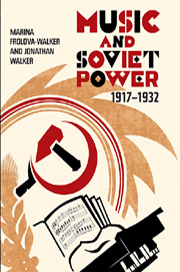Book contents
- Frontmatter
- Contents
- Preface
- Acknowledgements
- Note on transliteration
- Chronology of Political and Musical Events
- October 1917–18: Out of Chaos
- 1919: Depression and Fever
- 1920: Bureaucracy on the Rise
- 1921: Should I stay or should I go?
- 1922: Just Like the Old Days?
- 1923: The Birth of ASM and RAPM
- 1924: ASM in the Ascendant
- 1925: Equilibrium
- 1926: Guests from the West
- 1927: Celebrations
- 1928: At the Crossroads
- 1929: Velikiy perelom – The Great Turning Point
- 1930: RAPM's Glorious Year?
- 1931: RAPM's Fortunes Turning
- 1932: The Rules Change
- Key to Acronyms and Institutional Bodies
- Glossary of Names
- Bibliography
- Index
1919: Depression and Fever
Published online by Cambridge University Press: 05 April 2013
- Frontmatter
- Contents
- Preface
- Acknowledgements
- Note on transliteration
- Chronology of Political and Musical Events
- October 1917–18: Out of Chaos
- 1919: Depression and Fever
- 1920: Bureaucracy on the Rise
- 1921: Should I stay or should I go?
- 1922: Just Like the Old Days?
- 1923: The Birth of ASM and RAPM
- 1924: ASM in the Ascendant
- 1925: Equilibrium
- 1926: Guests from the West
- 1927: Celebrations
- 1928: At the Crossroads
- 1929: Velikiy perelom – The Great Turning Point
- 1930: RAPM's Glorious Year?
- 1931: RAPM's Fortunes Turning
- 1932: The Rules Change
- Key to Acronyms and Institutional Bodies
- Glossary of Names
- Bibliography
- Index
Summary
The Music Section of Narkompros (MUZO) continued in its attempts to organise the country's disparate and chaotic musical activities, and to direct these towards the needs (as it perceived them) of the working classes. In June, to minimise the duplication and confusion that was rife among the many fledgling organisations, Lunacharsky approved a statute that pronounced MUZO to be the sole body responsible for managing and unifying musical activities across the Soviet Republic. The statute's insistent language evinces a degree of desperation in the face of anarchy: ‘the resolutions of the Music Section are obligatory for all citizens, organisations and institutions of RSFSR without exception’. MUZO created a register of all existing choirs and orchestras in Moscow, and was soon able to offer the services of its own two choirs and a string quartet. It opened a People's Music School that was free to anyone with an ear for music, with Bryusova adding prestige to its teaching staff. In order to prevent their disappearance, many valuable pre-Revolutionary cultural institutions were nationalised and renamed, while most of the old personnel continued work much as normal. Even Sergei Zimin, the owner of the Private Opera (Moscow's second opera house), was retained in the salaried position of theatre manager. The many music shops and publishers were also nationalised, but again there was a desire to avoid disruption where possible: like Zimin, the prominent publisher Boris Jurgenson was retained as manager of the new state-run enterprise.
- Type
- Chapter
- Information
- Music and Soviet Power, 1917–1932 , pp. 23 - 36Publisher: Boydell & BrewerPrint publication year: 2012

